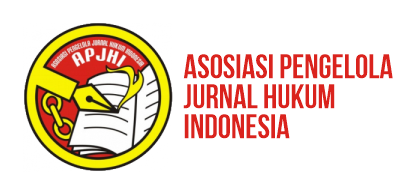Sanctions for Criminal Trafficking in Persons
Abstract
Keywords
Full Text:
PDFReferences
References
Book :
Brada Nawi Arief. No Title. Jakarta;PT RajaGrafindo Persada, 2016.
Fajar Ari Sudewo. PENOLOGI DAN TEORI PEMIDANAAN. Jawa Tengah;PT DJAVA SINAR PERKASA, 2021.
Farhana. Aspek Hukum Perdagangan Orang. Jakarta;Sinar Grafika, 2010.
Marlina dan Azmiati Zuliah. Hak Restitusi. Bandung;PT Refika Aditama, 2017.
Prasetyo, Teguh. Hukum Pidana. Jakarta: PT Raja Grafindo Persada, 2012.
R. Abdoel Djamali. Pengantar Hukum Indonesia. Jakarta;Rajawali, 2013.
Yuhelson. Pengantar Ilmu Hukum. Gorontalo;Ideas Community, 2013.
Journal Articles :
Adilya, Ferdy Rizky. "Putusan Hakim Pidana Yang Berkeadilan Substantif Melalui Pendekatan Hukum Progresif Dalam Perspektif Penologi." Jurnal Aktualita 1, no. 2 (2018).
Alhasni, M. R., Badu, L. W., & Nggilu, N. M. "Menakar Peran Kepolisian Dalam Mencegah Tindak Pidana Pencabulan Terhadap Anak Di Bawah Umur." Jurnal Legalitas 12, no. 2 (2019): 110-23.
Sarson, M. T. Z. "Criminal Acts Performed by Children in the Perspective of Criminology (Case Study in Gorontalo City on 2008-2012)." Indonesian Journal of Advocacy and Legal Services 1, no. 2 (2020): 205-22.
Website :
Abdul Muqtadir Al-Haq. "Penologi." Accessed September 6, 2022. http://pembelajaranhukumindonesia.blogspot.co.id/2011/10/penologi.html.
Andri Marpaung, S.H. & Partners. "TEORI-TEORI PEMIDANAAN DAN TUJUAN PEMIDANAAN" n.d. https://www.lawyersclubs.com/teori-teori-pemidanaan-dan-tujuan-pemidanaan/.
Sofian, Ahmad. "Maraknya Prostitusi Anak, Sebagai Komoditas Trafficking Untuk Tujuan Seksual." Ecpat indonesia. Accessed June 28, 2022. https://ecpatindonesia.org/berita/maraknya-prostitusi-anak-sebagai-komoditas-trafficking-untuk-tujuan-seksual/.
DOI: https://doi.org/10.33756/eslaj.v4i2.18277
Refbacks
- There are currently no refbacks.
Copyright (c) 2022 Febriyana Febiola Onggi
License URL: http://creativecommons.org/licenses/by-sa/4.0/
| | | |
| | | | |
| | | | |
| | |
Estudiante Law Journal has been available at:
| | | | |
| | | | |
| | | | |
| | | | |




-2.png)
.png)





